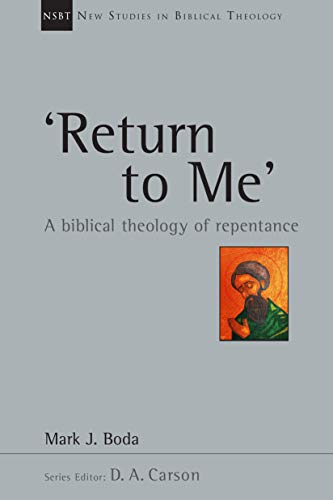A Brief Book Summary from Books At a Glance
By Steve West
About the Author
Mark J. Boda is Professor of Old Testament at McMaster Divinity College and Professor in the Faculty of Theology at McMaster University, Hamilton, Ontario, Canada. He is the author of numerous books and articles.
Introduction
In this contribution to the New Studies in Biblical Theology series, Mark Boda presents a biblical theology of repentance. He capably draws out both the distinctive nuances and the commonalities of the biblical material across the canon. The majority of the book deals with the Old Testament teaching, which is essential in its own right, but which is also crucial for understanding the New Testament’s teaching on the subject. Boda demonstrates both how pervasive and how essential this teaching on repentance is in the canon.
Table of Contents
Chapter 1 Introduction
Chapter 2 Repentance in the Torah
Chapter 3 Repentance in the Former Prophets
Chapter 4 Repentance in the Latter Prophets: Penitential Process
Chapter 5 Repentance in the Latter Prophets: Isaiah
Chapter 6 Repentance in the Latter Prophets: Jeremiah and Ezekiel
Chapter 7 Repentance in the Latter Prophets: The Twelve
Chapter 8 Repentance in the Writings: Wisdom and Worship
Chapter 9 Repentance in the Writings: Exile and Restoration
Chapter 10 Repentance in the Writings: Chronicles
Chapter 11 Repentance in Old Testament Theology
Chapter 12 Repentance in the New Testament
Chapter 13 Repentance in New Testament Theology
Chapter 14 Theological Implications of Repentance
Summary
Chapters 1 & 2: Introduction: Repentance in the Torah
The doctrine of repentance has been at the center of theological debates throughout church history. Biblical theology is modeled in the Bible itself and should be pursued today. God has given us his word in inscripturated form, and it is coherent, understandable, and authoritative. God’s word was given progressively and is now in its cumulative form. The OT canon was shaped intentionally by redactors for a canonical audience. Tracing a theme across the canon requires sensitivity to every piece of literature.
Key words are important, but concepts can be expressed in passages where the key vocabulary is absent. Vocabulary words can refer to internal or external change, repentance, turning away, turning towards, returning, apostasy, and the like. Many of the original language words can function as rough synonyms, and they can also have a range of meaning that goes beyond theological repentance. Zechariah 1:1-6 and Acts 26:16-20 are key passages. They show that repentance is turning to God in a faithful relationship, and turning away from sin and estrangement. Repentance involves change in behavior and affections, and can also involve verbal confession and ritual enactments (e.g. wearing sackcloth or fasting).
[To continue reading this summary, please see below....]The remainder of this article is premium content. Become a member to continue reading.
Already have an account? Sign In
